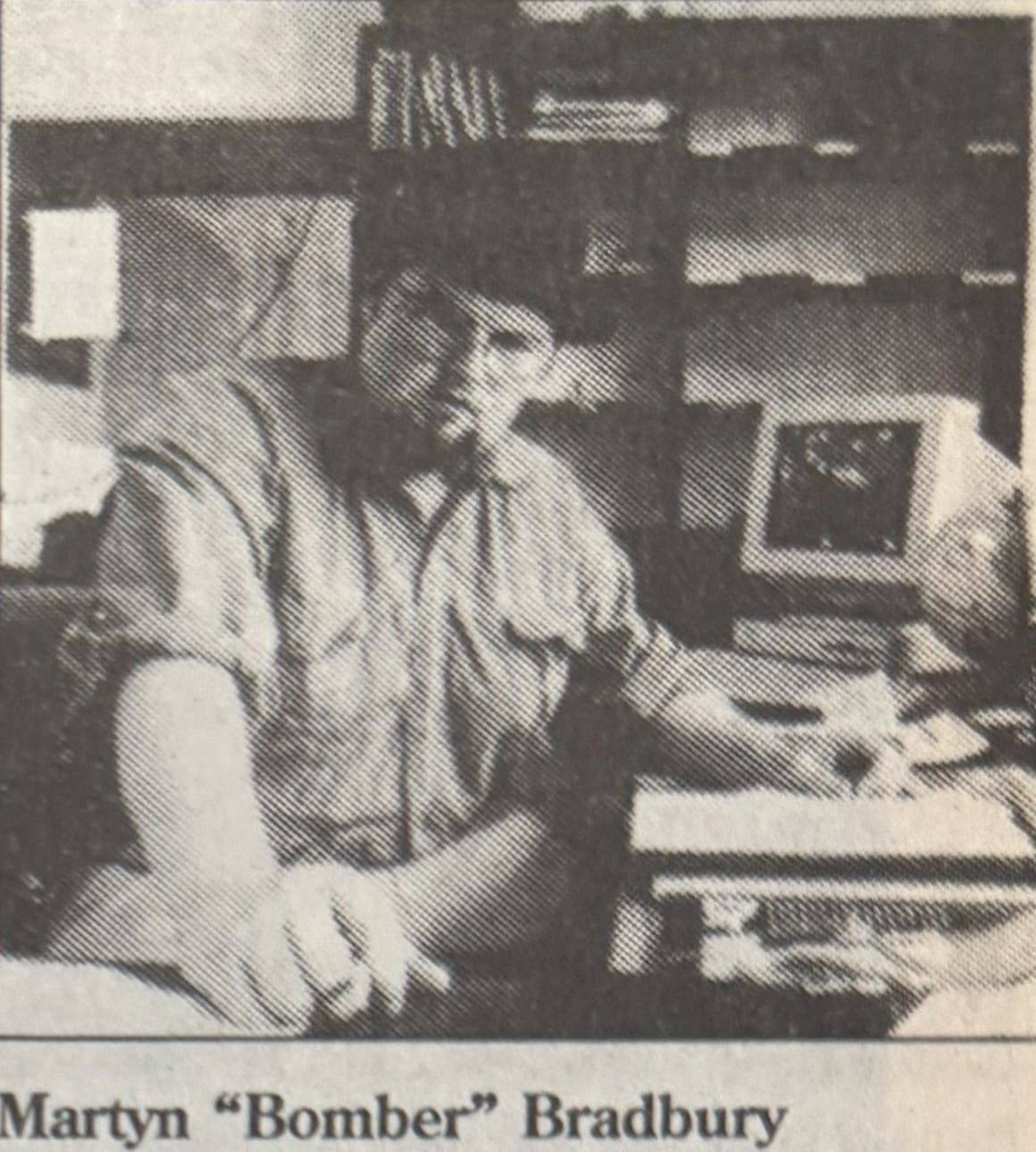Interview with Martyn "Bomber" Bradbury | Craccum Co-Editor 1995 & Editor 1997
Martyn "Bomber" Bradbury is one of Craccum's legendary editors. Find out more about his time at Craccum in 1995 & 1997 here.

Martyn "Bomber" Bradbury is one of Aotearoa's most outspoken journalists, one of a handful of editors who were elected to helm Craccum Magazine more than once, and one of the few who have their own Wikipedia page. And for good reason, too.

The other week, I asked Bomber some questions about his uni days at Craccum, which was undoubtedly a golden age for the magazine. Back then, Craccum had no budget concerns, with 10,000 copies distributed a week, and each issue spanning an eye-popping 88 pages!
The unapologetic boldness of his era is something that I hope will inspire future Craccum Editors to be more outspoken about the issues we face today. Back then, he was putting out provocative and spicy issues on the regular, which makes the Craccum of today look not just tame but docile. Like Issue 666 (The Devil Issue), The Genitalia Issue or even a full-page illustration with the Pope smoking weed. Pushing the boundaries of freedom of speech and press was the daily grind for Craccum in the mid-late 90s.

Although Craccums from 1995 and 1997 have not yet been fully digitised (don't worry, that's my next top priority), I've attached two example issues below that will give you a taste of the type of stuff Craccum was putting out under his leadership.
Craccum would like to thank Bomber for this interview and for also recently taking the time to come along and speak with wisdom at our Forbidden Edition workshop. Without further ado, the interview:
It says you got your nickname “Bomber” from your time at Craccum. Do you remember the story of how you got that nickname?
I had worked at Craccum for 3 years as the Poetry Editor before I was elected Editor and was nicknamed 'Bomber' by the second Editor I worked under. It stuck for 33 years. It's a terrible nickname for trying to get through Airport security with.
In 1995, you became the Co-Editor-in-Chief of Craccum for the first time. How did you get there? Tell us your Craccum story from when you first heard of the magazine up to that point.
After 3 years as Poetry Editor, I ran as co-Editor with a mate to stop the Political Right winning the Editorship. In 1994 student loans were smashing us and the right to free education was being destroyed by the neo-liberal right. Who ran Craccum was a huge ideological deal and the election was the second biggest political event outside the Presidency on campus. We won the second largest majority ever in the history of Craccum.

What was the spirit of Craccum in 1995? Would you say it was a continuation or a break from the style of the previous year?
Total socialist anarchy. We believed passionately in free speech and using the University Student Magazine to radicalise and engage students because they were the conscience of society and if we didn't engage in protest, who the hell would?
What was something new to Craccum you introduced in 1995? What was the rationale behind it?
I started the Craccum Unplugged series where we put out parody covers of other magazines and political satire. We published joke adverts for sex phone lines with John Banks home phone number in them and fake TV listings skewering TVNZ.

What was an issue or article you remember you were particularly proud of in 1995, and why?
Our Free Speech issue where I printed a 'How to shoplift' guide, 'How to declare bankruptcy and escape your student loan' (Parliament actually ended up passing a law specifically stopping this because of our article) and a 'How to build a nuclear bomb'. This last story saw me dragged into the Auckland Police Station with an AUSA lawyer for an official interview where they attempted to charge me for terrosim because I had published how to make a nuclear bomb. I explained I got the recipe from a 5th form science text book, so if they wanted to arrest me, they were going to have to arrest every 5th former in the country.
What did Craccum’s staff look like at the time? Who did what, and how did you manage the team and direction of the publication?
We had a graphic designer, Arts Editor, News Editor, Advertising Rep, Delivery crew, pool of news journalists and a pool of reviewers. All funded thanks to Universal Student Union Membership.
How did you get contributor submissions at the time? Did you face any difficulties engaging readers?
We pushed boundaries every issue and would get stories into the mainstream with a lot of ease. Our Expose on gang members selling hard drugs in the upper common room saw the infamous Parnel Panther threaten to kill us both after we identified him. There was never a dull moment.
What do you think was the greatest challenge UOA students faced in 1995? How did Craccum report on it/make a difference?
We were operating before social media so our platform was a rare space where youth opinion could be heard. Our anger at the unfairness of user pays education was the main issue and all the points we raised that would happen because of user pays education (students fleeing and not being able to come home, putting off having kids, the impact on being able to buy a house, the dumbing down of society), these have all been bourne out.
What was the relationship between Craccum and AUSA like in the mid-90s?
It was incredibly close, we saw ourselves as an extension of the AUSA whanau, and we were there to represent them and their mission. I believed passionately in having as many diverse opinions in the magazine as possible, so I had Feminist, Gay, Māori, Pacifica writers and the AUSA President and AUT President and many other officer holders all writing weekly columns so that we had a diversity of voices.
Some say no one wants to advertise in Craccum or student mags anymore. How did Craccum get advertisers in the mid-90s?
Because there were such few avenues for advertising, we would make insane amounts of money. I think our budget per issue was around $10 000.
In 1997, you became the sole Editor-in-Chief of Craccum. Tell us about what happened between 1995 and 1997, and why you came back to the role?
I won the second highest margin for a victory in 1995, lost by the smallest margin in 1996 and then won it back with the highest margin ever in 1997. The ideological clashes between the right and the left for control over the Editorship saw me win in 95, lose in 96 and win it back in 97. I just loathed the right wing stooges who took over the magazine in 1996 and vowed to win it back. No one else has done that.
Not many Editors have had two terms at the helm of Craccum. What was something you did differently the second time around that you learnt from your first term?
I was far more prepared to push the limits even further in my second term. The protest movement against user pays was growing and the tactics were becoming more pushy and shovey with the Police. We printed all the badge numbers of cops who were bashing students during protests, and the cops we busted turned up at my house the next morning with search warrants to intimidate me into not publishing their badge numbers again. Immediately after they had searched my house and threatened me, I rang the mainstream media and told them what they had done. The mainstream media published the story of the Police harassing me at home, and they didn't pull that trick again. Fuck the Police.

Having worked as a Co-Editor and sole Editor, which arrangement did you prefer and why? Did Craccum’s workload ever interfere with your ability to study?
I preferred being sole editor because you could make decisions quicker, I was very fortunate to have many understanding lecturers. I graduated with a double major in English and Philosophy.
What was the spirit of Craccum in 1997? Would you say it was a continuation or a break from the style of the previous year?
More jokes, way more swearing and getting into more trouble with the Authorities. We went after Booze companies and did a lot of spoof adverts for their products. Lion Red wrote to AUSA and threatened they would sue me if I kept mocking Lion Red. I responded by doing a double page spread mocking Lion Red.

Anything you’d like to say or pass on to future Craccum editors? Any dos or don’ts?
Know defamation law, always speak truth to power, be funny and raise bloody hell dammit!
If you’d had a third term as Editor of Craccum, what would you have done differently?
I think I would have expanded the internal training for staff more. There have been so many incredible journalists who have come through Uni media, I was President of ASPA for a year which was the Uni Media National body and worked briefly with Grant Robertson, those contacts are ones that should be available for student media as they move through their careers.

If you could ask a question to previous Craccum editors for advice, what would it be?
How do I get free booze from Shadows?
What, in your opinion, is the purpose of a student magazine?
Universities are the conscience of society, be a media that reflects that with courage.





